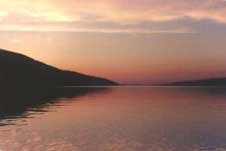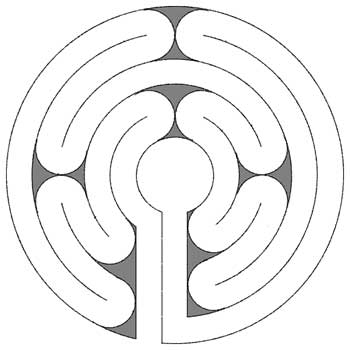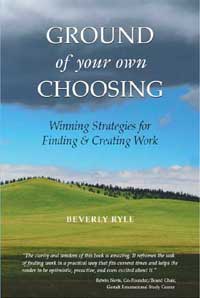Tag
Crooked Handle Careers

Easy question for Halloween—if you see a broom with a crooked handle resting against a wall what immediately comes to mind?
Back in August I saw a row of beautifully crafted ones, all suitable transportation for Elvira Gulch, at a local craft fair, but having just been to an exhibit honoring the Shakers my first thought wasn't of the Wicked Witch of the West. What got my attention was how these handmade products stood out in our mass produced, made-in-China world.
The woman manning the booth had left a corporate position in sales and marketing to become a partner in a broom making business because it enabled her to combine her business skills with the crafts she had learned growing up in rural Vermont.
I Want

What do you want?
If you think this is an easy question to answer, try this: write the words “I want” on successive lines of a legal pad or a piece of ruled notebook paper and make a complete sentence out of each, all the way to the bottom of the page.
How far did you get?
Strange Juxtaposition
 The first half dozen pages of the November issue of Real Simple were just the kind of thing you’d expect from a glossy magazine—double page ads for makeup, cashmere sweaters, and a sonic foot care system.
The first half dozen pages of the November issue of Real Simple were just the kind of thing you’d expect from a glossy magazine—double page ads for makeup, cashmere sweaters, and a sonic foot care system.
It was the next couple of pages that brought me up short.
On the left, beneath the word “Thoughts” there was a striking photograph of an island with a grove of birch trees whose russet leaves covered the ground and a boardwalk inviting the reader to stroll over a patch of slate blue water lined with the afternoon shadows of the trees to the solitude and peace of the island.
Near the bottom of the page there was a quote from Henry David Thoreau: "I am grateful for what I am and have. My thanksgiving is perpetual. It is surprising how contented one can be with nothing definite—only a sense of existence.
On the right there was a full page ad dominated by an enormous image of a bottle of facial lotion floating inside a water balloon (presumably to highlight its moisturizing qualities).
It was such a strange juxtaposition. I couldn’t help but wonder what Thoreau would have to say about it.
A New Story
 This summer I’ve been studying the Alexander Technique, an educational process developed by New Zealander F. M. Alexander in the early 1900's that teaches you how to release tension by sending messages to your body to undo unnecessary patterns of holding.
This summer I’ve been studying the Alexander Technique, an educational process developed by New Zealander F. M. Alexander in the early 1900's that teaches you how to release tension by sending messages to your body to undo unnecessary patterns of holding.
I’ve been pleasantly surprised to discover that Alexander’s idea of achieving greater freedom and ease of movement works also with more than just muscles, nerves and bones.
Looking for places in my body where I habitually store stress, it didn’t take long for me to discover what felt like a sizzling mass of hot wires in the back of my neck and left shoulder blade that appeared whenever I was provoked by an unpleasant sensation, e.g. sitting for a long period of time in summer traffic.
But it took a while to figure out where I stashed my emotional patterns of holding. When I heard myself sharing a painful situation in my life exactly the way I’d shared it for the last two years, I knew I’d hit paydirt.
Farm Raised
 We live in absurd times—what should be natural has become unusual and what was once taken for granted is touted as exceptional.
We live in absurd times—what should be natural has become unusual and what was once taken for granted is touted as exceptional.
I’ve been aware of this trend for some time, but it came into clear focus recently when I read the words “Farm Raised” in bold print on the front of a carton of organic milk.
Having grown up in an era when the New England countryside had more dairy farms than shopping malls, my first thought was, “Where else?” But sadly I know enough about how the “food-industrial complex” works to understand that most of the milk in the dairy case comes from places that are a lot more like factories than farms.
Skaneateles 2012
 Dear Reader,
Dear Reader,
As you read this, I am on my annual rest-read-write retreat at Skaneateles Lake, so I am offering this column about a past trip in 2010. Of course, I don’t yet know what will come from the creative space of this year's visit, but I promise to let you know in a future column.
My time at the lake this year was about being in the here and now. I try to do this at home, but being away frames it differently.
There's the packing and the unpacking, the seven hour trip there and back, the joy of arriving and the sadness of leaving. Going to the same place every year has sharpened my awareness of these dichotomies, and I know the alternating rhythm well enough that sway with it immediately.
Yes Men Transformed
 In Free Agent Nation, Daniel Pink suggests watching two films to get an idea of how the world of work has changed since the middle of the twentieth century.
In Free Agent Nation, Daniel Pink suggests watching two films to get an idea of how the world of work has changed since the middle of the twentieth century.
The Man in the Gray Flannel Suit (1956) is about a public relations executive, the Organization Man of the 1950s.
Jerry Maguire (1996) is the story of a West Coast sports agent who navigates today's freewheeling entrepreneurial culture.
But what struck me on the snowy afternoon that I watched these movies back to back was not so much how the culture of work has changed, but how much it has remained the same.
The Labyrinth
 Growing a lawn, as opposed to isolated clumps of grass, is a problem on a sand bar, which is a good description of outer Cape Cod, where I live.
Growing a lawn, as opposed to isolated clumps of grass, is a problem on a sand bar, which is a good description of outer Cape Cod, where I live.
After years of trying without success, this Spring my husband announced that he was giving up, and he was going to put down mulch because he was sick of mowing dirt.
I have a strong preference for the natural look, so I balked at the idea of covering what little green we have with brown—or worse yet, red—mulch.
We compromised on ground cover and shrubs in the front, but what to do on side of the house remained unsettled until I had a wild idea in the middle of the night—we could build a labyrinth.
A labyrinth is an ancient symbol for wholeness. It combines the circle and the spiral into a meandering but purposeful path representing a journey to one’s own center and back again into the world.
Cape Cod Ice
 Sometimes I’ve just had it with the absurd extremes marketing goes to and I have to stand up and say, "Enough!"
Sometimes I’ve just had it with the absurd extremes marketing goes to and I have to stand up and say, "Enough!"
In the window of a convenience store near my house there is a sign which announces, "Cape Cod Ice Sold Here."
The Cape offers many wonderful things—clam chowder, lobsters, glorious beaches, and cranberries, to name a few—but no one ever returned from a vacation here saying, "I can't wait to go back next year for some more of that fabulous Cape Cod ice." Give me a break!
Brake to Recharge
 It seems like just about everyone I've talked to lately has commented about the accelerated pace of their lives.
It seems like just about everyone I've talked to lately has commented about the accelerated pace of their lives.
I hear it in ubiquitous phrases, like, "I've just been so busy, flat out, swamped, etc."
I feel it in the genuine regret I experience when I have to say no to something I want to do or find myself postponing being with a friend or colleague whose company I enjoy because I'm booked solid.
Although it's comforting to know I'm not alone, it's also alarming to realize that the goal of living a more balanced rhythm is eluding so many of us.
Could over-scheduling be like global warming, sneaking up on us by degrees and threatening our well-being?
Fortunately, last October, after a period of trying to normalize my overextendedness resulted in failure, I became painfully aware that I was driving myself too hard.






